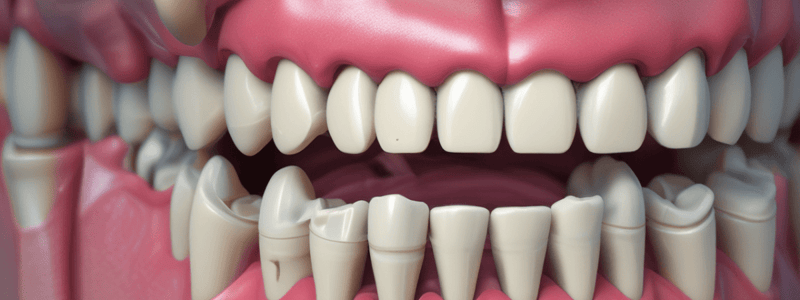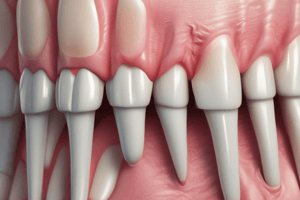Podcast
Questions and Answers
What is the main function of fibroblasts in the periodontal ligament?
What is the main function of fibroblasts in the periodontal ligament?
- Resorption of bone
- Formation of ground substance and collagen fibers (correct)
- Synthesis of alkaline phosphatase
- Formation of cellular cementum
What is the characteristic of periodontal ligament that enables it to replace and remodel damaged fibers?
What is the characteristic of periodontal ligament that enables it to replace and remodel damaged fibers?
- Degeneration of old fibers
- Renewal capability (correct)
- Inflammation
- Formation of new fibers
What is the primary function of osteoblasts in the periodontal ligament?
What is the primary function of osteoblasts in the periodontal ligament?
- Formation of cellular cementum
- Bone formation and growth (correct)
- Formation of ground substance and collagen fibers
- Bone resorption
What is the characteristic feature of osteoclasts?
What is the characteristic feature of osteoclasts?
What is the function of cementoblasts in the periodontal ligament?
What is the function of cementoblasts in the periodontal ligament?
What is the process of bone resorption by osteoclasts?
What is the process of bone resorption by osteoclasts?
What is the characteristic feature of cementoclasts?
What is the characteristic feature of cementoclasts?
What percentage of cells in the periodontal ligament are fibroblasts?
What percentage of cells in the periodontal ligament are fibroblasts?
Which of the following is NOT a source of arterial blood supply to the periodontal ligament?
Which of the following is NOT a source of arterial blood supply to the periodontal ligament?
What is the primary composition of the principal fibers of the periodontal ligament?
What is the primary composition of the principal fibers of the periodontal ligament?
What is the function of the small nerve fibers in the periodontal ligament?
What is the function of the small nerve fibers in the periodontal ligament?
Which of the following groups of periodontal ligament fibers is NOT mentioned as a principle fiber group?
Which of the following groups of periodontal ligament fibers is NOT mentioned as a principle fiber group?
What is the role of Sharpey's fibers in the periodontal ligament?
What is the role of Sharpey's fibers in the periodontal ligament?
What is the primary source of the nerve supply to the periodontal ligament?
What is the primary source of the nerve supply to the periodontal ligament?
Which of the following statements about dental implants is TRUE?
Which of the following statements about dental implants is TRUE?
What is the main function of the periodontal ligament?
What is the main function of the periodontal ligament?
What is the main function of fibroblasts in the periodontal ligament?
What is the main function of fibroblasts in the periodontal ligament?
Where are progenitor cells primarily found in the periodontal ligament?
Where are progenitor cells primarily found in the periodontal ligament?
What do epithelial cell rests of Mallassez primarily indicate?
What do epithelial cell rests of Mallassez primarily indicate?
What characterizes the defensive role of macrophage cells in the periodontal ligament?
What characterizes the defensive role of macrophage cells in the periodontal ligament?
What is the composition of the ground substance in the periodontal ligament primarily made of?
What is the composition of the ground substance in the periodontal ligament primarily made of?
What distinguishes cementoclasts from osteoclasts?
What distinguishes cementoclasts from osteoclasts?
Which of the following statements about mast cells is TRUE?
Which of the following statements about mast cells is TRUE?
What happens to the number of epithelial cell rests of Mallassez with age?
What happens to the number of epithelial cell rests of Mallassez with age?
What is the primary function of the periodontal ligament (PDL)?
What is the primary function of the periodontal ligament (PDL)?
What is the width range of the periodontal ligament?
What is the width range of the periodontal ligament?
Which type of cells in the PDL is responsible for resorption?
Which type of cells in the PDL is responsible for resorption?
How does the thickness of the PDL change with age?
How does the thickness of the PDL change with age?
What type of connective tissue makes up the periodontal ligament?
What type of connective tissue makes up the periodontal ligament?
Which of the following is NOT a synthetic cell found in the PDL?
Which of the following is NOT a synthetic cell found in the PDL?
What is the shape of the periodontal ligament?
What is the shape of the periodontal ligament?
Which of the following components is NOT found in the periodontal ligament?
Which of the following components is NOT found in the periodontal ligament?
Study Notes
Periodontal Ligament (PDL)
- The periodontal ligament is a soft, fibrous specialized connective tissue situated between the cementum and bone in the periodontal space.
- It extends coronally up to the most apical part of connective tissue of gingiva.
- The collagen fibers are attached to the cementum and alveolar bone, providing soft tissue continuity between the mineralized connective tissues of periodontium.
- The PDL has the shape of an hour glass and ranges in width from 0.15-0.38mm, being thinnest in the mid-root area and decreasing slightly in thickness with age.
Histological Structure of PDL
- The PDL is formed from:
- Intercellular substances
- Synthetic fibers
- Resorptive cells
- Progenitor cells
- Defensive cells
- Blood vessels
- Nerves and lymphatics
Synthetic Cells
- Fibroblasts:
- Most common cells in PDL, constituting about 65% of total population
- Found usually running parallel to the collagen fibers of PDL
- Responsible for formation of ground substance and collagen fibers of PDL
- Produce:
- Collagen fibers
- Reticulin fibers
- Oxytalan fibers
- Have the ability to replace and remodel damaged periodontal fibers (RENEWAL CAPABILITY)
- Osteoblasts:
- Responsible for bone formation and growth of bone tissue
- Situated along the surface of the bone lining the dental socket
- Synthesize collagen and ground substance of bone matrix
- Cementoblasts:
- Responsible for formation of cellular cementum
- Found covering the periodontal surface of the cementum
- Have ultrastructural characteristics typically of cells synthesizing protein
Resorptive Cells
- Osteoclasts:
- Resorb bone and tend to be large and multinucleated
- Have eosinophilic cytoplasm rich in acid phosphatase
- Usually present in depression in bone known as Howship’s lacunae
- Resorption occurs in two stages: removal of mineral and then exposed organic matrix disintegrates
- Cementoclasts:
- Resemble osteoclasts and are occasionally found in normal functioning PDL
- Found on the surface of cementum
Fibroblasts
- Capable of both synthesis and resorption of collagen fibers of PDL
- Presence of collagen-resorbing fibroblasts in a normal functioning periodontal ligament indicates resorption of fibers occurring during remodeling of periodontal ligament
Progenitor Cells
- Undifferentiated mesenchymal cells
- Can undergo mitotic division
- Can differentiate to different types of cells
- Have small, closed-face nucleus and little amount of cytoplasm
- Found close to blood vessels
Epithelial Cell Rests of Mallassez
- Remnants of Hertwig's epithelial root sheath
- Found in the PDL close to cementum
- Most numerous in the apical and cervical areas
- Can undergo calcification to form cementicles
Defensive Cells
- Macrophage cells (Histiocytes):
- Predominantly present in PDL
- Embedded adjacent to blood vessels and nerves
- Role:
- Phagocytosing dead cells
- Secreting growth factors that regulate the proliferation of adjacent fibroblasts
- Mast cells:
- Small round or oval cells containing numerous cytoplasmic granules
- Contain heparin and histamine
- Occasionally seen in healthy PDL
- May cause proliferation of endothelial and mesenchymal cells
Ground Substance and Interstitial Tissues
- Ground substance:
- Mainly consists of mucopolysaccharides and glycoprotein
- Fills the space between cells, blood vessels, and nerves
- Interstitial tissues:
- Found between the fibers of the periodontal ligament
- Areas that contain some of the blood vessels, lymphatic, and nerves
- Surrounded by loose connective tissue
Blood Supply and Nerve Supply
- Arterial blood supply:
- Derived from three sources: gingival vessels, intra-alveolar vessels, and apical vessels
- Nerve supply:
- Comes from either the inferior or superior dental nerves
- Nerve fibers are either of large diameter (responsible for touch and pressure) or small diameter (responsible for pain sensation)
Principle Fibers of the Periodontal Ligaments
- The most important element of periodontal ligament
- Principal fibers are collagenous in nature and arranged in bundles
- Primarily composed of bundles of type I collagen fibrils
- Vitamin C helps in formation and repair of collagen
- Classified into several groups based on their anatomic location:
- Alveolar crest fibers
- Horizontal fibers
- Oblique fibers
- Apical fibers
- Interradicular fibers
Studying That Suits You
Use AI to generate personalized quizzes and flashcards to suit your learning preferences.
Related Documents
Description
Learn about the periodontal ligament's composition, location, and role in connecting the cementum and alveolar bone in the periodontal space.




